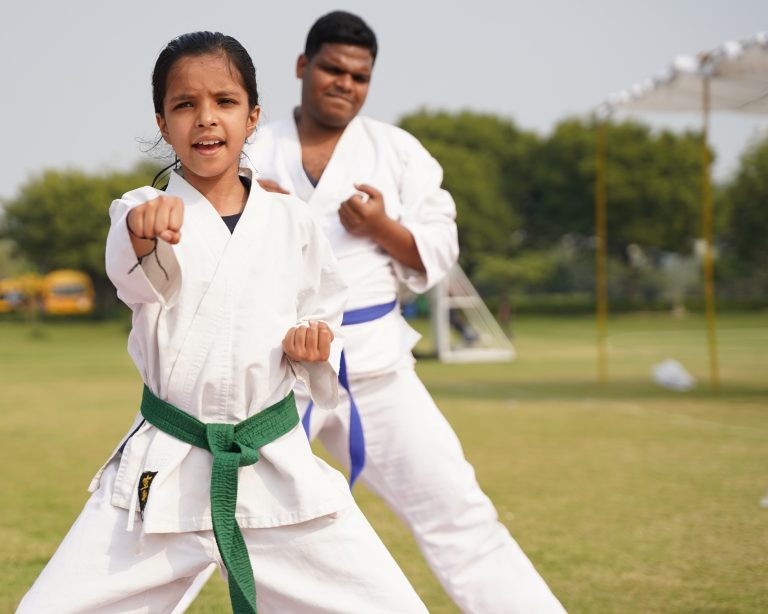Will Karate Help My Child’s Behavior?
Many parents are concerned about their child’s behavior, and they are always looking for ways to improve it. One option that is becoming increasingly popular is enrolling their children in karate classes. Karate is a martial art that has been around for centuries and is known to have many benefits. But the question remains, will karate help my child’s behavior? This post will answer that question and provide you with evidence-based information to help you make an informed decision.
The Benefits of Karate for Children
Before we answer the question, let’s take a look at some of the benefits of karate for children. Karate is not only a sport but also an art that teaches discipline, focus, self-control, and respect. These are all qualities that can help children develop better behavior and improve their overall well-being.
Karate is also a physically demanding activity, which means that it provides children with an opportunity to exercise and burn off excess energy. Regular physical activity is essential for maintaining good mental health and can help improve mood and behavior.
Karate and Self-Discipline
Karate teaches children the importance of self-discipline. Through repetitive practice and hard work, children learn to control their bodies and minds, develop better self-esteem and confidence, and gain a sense of accomplishment. They learn to set goals and work towards achieving them, which can be transferred to other areas of their lives, including academic performance and behavior.
By following the instructions and rules of karate, children learn self-control and respect. They learn to listen and follow instructions, and they learn to control their emotions and reactions. This can help them in situations where they may become frustrated or upset, enabling them to respond calmly and rationally.
Karate and Focus
One of the key benefits of karate is that it teaches children to focus. In a world that is filled with distractions, it can be challenging for children to stay focused on a task or activity. Karate helps to overcome these challenges by providing children with structured and repetitive exercises that require their complete attention. They learn to focus on their movements, breathing, and the task at hand, which can improve their ability to concentrate and stay focused in other areas of their lives, including academic performance and behavior.
Karate and Respect
Respect is one of the core principles of karate. Children learn to respect themselves, their peers, and their instructors. They learn to treat others with kindness and respect, and they learn to appreciate the value of teamwork. By developing respect, children learn to be more tolerant and understanding of others, which can promote improved behavior and better relationships with their peers.
Introduction
As a parent, one of the biggest concerns you have is probably your child’s behavior. As much as you try to teach your child good values and morals, sometimes it seems like nothing works. You may have heard about karate and how it can help children with their behavior, but you’re not sure if it’s true. In this blog post, we’ll be answering some of the most frequently asked questions about karate and how it can help your child’s behavior.
What is karate?
Karate is a martial art that originated in Okinawa, Japan in the 1800s. It’s a form of self-defense that uses punches, kicks, and other striking techniques. In addition to the physical aspects of karate, it also emphasizes mental and emotional development, such as discipline, focus, and respect.
What are the benefits of karate for kids?
Karate has numerous benefits for children, including:
Improved behavior
Karate can help children develop self-discipline, which can translate into improved behavior at home and at school. The discipline and structure of karate classes can also be helpful for children who struggle with routine and structure.
Increased self-esteem
As children work towards earning belts and achieving goals in their karate classes, they can develop a sense of accomplishment and increased self-esteem. This can also lead to a greater sense of confidence in other areas of their life.
Improved physical fitness
Karate is a physically demanding martial art that can help children develop strength, flexibility, and overall fitness. This can also be helpful for children who struggle with weight or other health issues.
Development of social skills
Karate classes provide an opportunity for children to interact with other children in a structured environment. This can help them develop social skills such as teamwork, communication, and leadership.
What specific behavior issues can karate help with?
Karate can be helpful for a variety of behavior issues, including:
Hyperactivity
Karate classes provide a structured activity that can help children with hyperactivity focus their energy in a positive way. The physical demands of karate can also help them burn off excess energy.
Aggression
Karate emphasizes self-control and respect for others, which can help children who struggle with aggression learn to control their impulses and behavior.
Low self-esteem
As mentioned earlier, karate can help children develop a sense of accomplishment and increased self-esteem.
Bullying
Karate classes can teach children self-defense techniques and help them build the confidence to stand up for themselves in bullying situations.
Can karate cure behavior problems?
While karate can be helpful for behavior issues, it’s not a cure-all. It’s important to remember that behavior problems can have a variety of underlying causes and may require additional support and treatment.
What should I look for in a karate school?
When selecting a karate school for your child, it’s important to do your research and find a school that aligns with your values and goals. Some things to look for include:
Qualified instructors
Make sure the instructors at the school have the appropriate credentials and experience.
Structured classes
Look for a school that has a structured curriculum and class schedule.
Emphasis on values
If you’re looking for a program that emphasizes values such as respect and discipline, make sure the school aligns with those values.
How Karate Can Help Improve Your Child’s Behavior
Karate is an ancient martial art that has been practiced for centuries in Japan. It is a sport that is not only physically demanding but also teaches discipline, respect, and self-defense. Many parents have considered enrolling their children in karate classes to help them improve their behavior, and rightfully so. In this blog post, we will give you a detailed guide on how karate can help develop your child’s behavior and provide step-by-step instructions on how to get started with karate classes.
What is Karate
Karate is a martial art that originated in Okinawa, Japan, and has been practiced for hundreds of years. It involves striking, kicking, punching, and blocking techniques as well as grappling and joint-locking moves. The goal of karate is to develop discipline, strength, and focus while promoting respect, humility, and non-violent behavior.
How Can Karate Help Your Child’s Behavior
Karate has numerous benefits for children, including:
Developing Discipline
Karate classes focus heavily on discipline, which can have a positive impact on your child’s behavior. The rules and structure of karate classes help children understand the importance of following instructions, respecting their peers, and paying attention to their surroundings. This can translate into better behavior at home and in school.
Promoting Confidence and Self-Esteem
Karate classes can help boost your child’s confidence and self-esteem. As they advance in their training, they will learn new techniques, improve their physical ability, and earn new belts. This can give them a sense of accomplishment and pride in their abilities which can carry over into other aspects of their life.
Teaching Self-Defense
Karate teaches children valuable self-defense skills that can help them protect themselves in dangerous situations. However, it is important to note that karate also emphasizes non-violent conflict resolution and encourages children to avoid physical altercations whenever possible.
Reducing Aggression
Karate can also help reduce aggression in children. Through regular training and practice, children learn to control their impulses and develop patience and self-control. This can help reduce aggressive behavior and replace it with more positive and productive habits.
How to Get Started with Karate
If you’re interested in enrolling your child in karate classes, here are some step-by-step instructions to help you get started:
Step 1: Find a Qualified Instructor
The first step in getting started with karate is to find a qualified instructor. Look for an instructor who is certified and experienced in teaching children. You can search online for local karate schools or ask for recommendations from friends or family members.
Step 2: Evaluate the School and Instructor
Visit the karate school and observe a class or two to evaluate the instructor’s teaching style and the behavior of the students. Look for a school that has a positive learning environment and emphasizes discipline, respect, and self-defense.
Step 3: Register Your Child and Purchase Equipment
After selecting a karate school, register your child for classes and purchase the necessary equipment. This typically includes a karate uniform, protective gear, and a bag to carry everything in.
Step 4: Attend Regular Classes
Make sure your child attends regular karate classes and practices regularly. Consistent training is necessary to make progress and develop positive habits that will carry over into other aspects of their life.
Step 5: Encourage Your Child’s Progress
Encourage your child’s progress and celebrate their achievements. Recognize their hard work and discipline, and provide positive reinforcement to help them stay motivated and engaged in their karate training.
Conclusion
Karate can be an excellent way to help your child develop positive behavior habits and skills that will benefit them throughout their life. By following these step-by-step instructions and finding a qualified instructor, you can give your child the opportunity to learn valuable lessons in discipline, respect, self-defense, and self-esteem.
Inhaltsverzeichnis






